
Mini Fridges That Mean Business - Top Commercial Picks
Share
Mini Fridges That Mean Business: What You Need to Know
A commercial mini fridge is a specialized refrigeration unit designed for business environments that require durability, consistent cooling, and food safety compliance. If you're looking to buy one, here's what sets them apart:
- Purpose-built for business use with 24/7 operation capability
- NSF certification for food safety compliance
- Temperature consistency within 2-4°F of set point
- Price range: $175-$5,500 depending on size and features
- Capacity options: 1.6 cu.ft. to 72 cu.ft.
Commercial mini fridges come in several distinct types to meet different business needs:
- Glass-door merchandisers - For customer-facing beverage and food display
- Solid-door units - For back-of-house storage with maximum insulation
- Under-counter models - For space-saving installation in tight areas
- Back-bar coolers - Designed specifically for drink service
- Drawer-style units - For prep line access and organization
Unlike residential mini fridges, commercial models feature heavy-duty components that withstand frequent door openings, maintain precise temperatures, and often include security features like locks. They're designed to meet health department requirements while maximizing energy efficiency in high-demand settings.
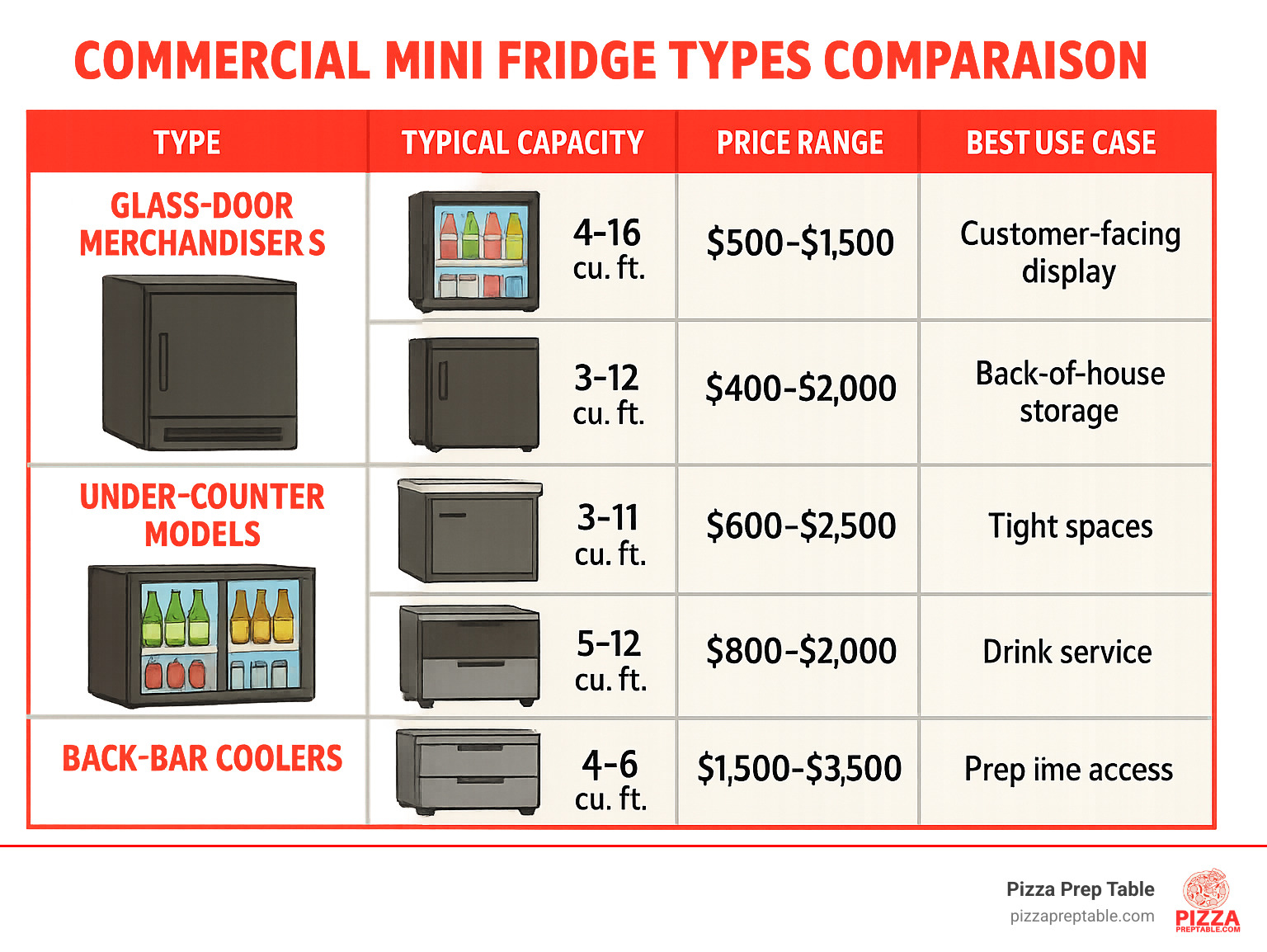
Must-know commercial mini fridge terms: - commercial fridge for sale - commercial fridge freezer combo
What Sets a Commercial Mini Fridge Apart?
Ever wondered why that little fridge behind the bar costs so much more than the one in your dorm room? It's not just fancy pricing – commercial mini fridges are built differently from the ground up.
In my years helping restaurant owners find the right equipment, I've seen how these workhorses earn their keep. While your home mini fridge might get opened a handful of times daily, a busy café's unit might face hundreds of door swings in a single shift! That's why commercial units come with reinforced hinges, beefier compressors, and thicker insulation.
Temperature precision is another game-changer. A commercial mini fridge typically stays within 2-4°F of your set point, while residential models might swing 5-10°F in either direction. When you're storing foods that need to stay in specific temperature ranges for safety, this precision isn't just nice – it's necessary.
Commercial units are also marathon runners, not sprinters. They're engineered for 24/7 operation in environments that would make residential fridges throw in the towel – from steamy kitchens to busy storefronts with constant door openings.
Other differences include heavy-duty materials (higher gauge stainless steel that can take a beating), easy-clean surfaces designed with health inspectors in mind, security features like locks, and warranties specifically written for business use.
Compressor vs. Thermoelectric Cooling
When shopping for a commercial mini fridge, you'll encounter two main cooling technologies, each with its own sweet spot:
| Feature | Compressor-Based | Thermoelectric |
|---|---|---|
| Cooling Power | Superior (35-40°F regardless of ambient temp) | Limited (20°F below ambient temp) |
| Noise Level | Moderate (cycling on/off) | Very quiet (continuous operation) |
| Energy Efficiency | More efficient for larger units | More efficient for very small units |
| Price Range | $200-$5,500 | $70-$200 |
| Best For | Food storage, beverage merchandising | Cosmetics, medications, quiet environments |
| Durability | High (10+ year lifespan) | Moderate (3-5 year lifespan) |
For most food businesses, compressor-based models are the only realistic option. The KoolMore commercial display refrigerator uses compressor technology to maintain food-safe temperatures even when the door's constantly opening and closing during a lunch rush.
Thermoelectric models like the Cooluli Classic 10L have their place too – particularly in hotel rooms or spas where silence is golden. These units use the Peltier effect (electricity passing through two different materials) to transfer heat without moving parts, meaning virtually silent operation.
Safety & Certifications
In commercial refrigeration, those little certification labels aren't just decoration – they're your business protection plan.
NSF-7 certification ensures your unit meets public health standards for food storage. This is the sticker health inspectors look for first. Without it, you might as well put out a "please give me a violation" sign.
UL Listing confirms the electrical components won't turn your establishment into a fire hazard. It's the peace of mind that comes from knowing your equipment has been tested for safety.
Department of Energy (DOE) Compliance means your unit meets minimum efficiency standards – important for both your utility bills and legal compliance.
ENERGY STAR certification, while optional, identifies units that go above and beyond efficiency requirements. These often qualify for utility rebates that can offset the initial cost difference.
Best Commercial Mini Fridges by Category
Finding the perfect commercial mini fridge isn't just about picking any old cooler—it's about matching the right type to what your business actually needs. We've helped countless restaurants, cafés, and shops find their ideal compact cooling solution.
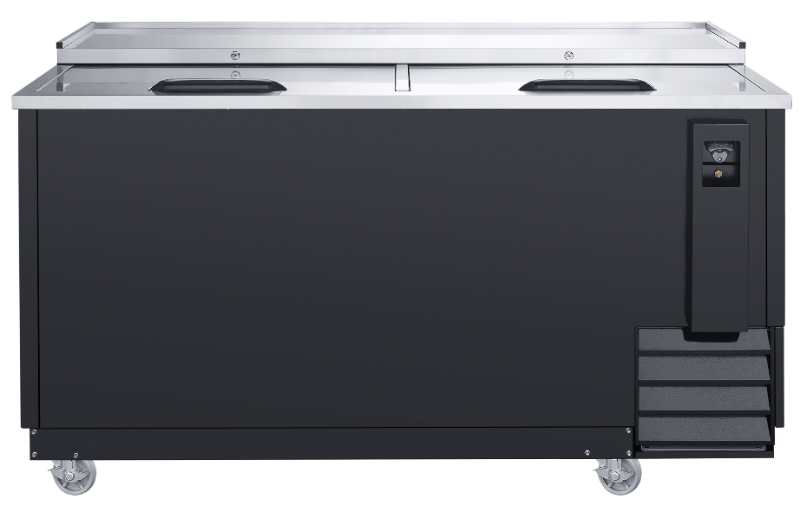
Glass-Door Merchandisers – Showcase & Sell
There's something magnetic about seeing cold drinks through glass—it practically sells itself! Glass-door merchandisers are the showstoppers of the commercial mini fridge world, designed to put your beverages and packaged foods on full display while keeping them perfectly chilled.
The KoolMore 6 cu. ft. Commercial Display Merchandiser ($807.45) is a customer favorite with good reason. Its bright LED interior lighting makes your products pop without heating them up (unlike old-school bulbs), and the self-closing door is a lifesaver during rush periods. The digital temperature control lets you dial in the perfect chill, while adjustable shelving accommodates everything from tall bottles to small snacks.
We've seen these units work wonders in convenience stores, gym lobbies, and cafés. One of our clients in Phoenix told us their beverage sales jumped nearly 30% after installing a glass-door mini merchandiser near their checkout—turns out, seeing is buying!
Solid-Door Workhorses – Maximum Chill & Security
When you need serious cooling power and security, solid-door commercial mini fridges are your best friends. They trade visibility for superior insulation and temperature retention—perfect for back-of-house operations.
The Summit Appliance MB42SS packs impressive performance into a tiny footprint (just 19.88" H x 17.63" W x 17.75" D). Its reversible door means it can fit practically anywhere, while the front lock keeps inventory secure. The forced-air cooling system ensures uniform temperatures throughout, so everything stays perfectly chilled no matter where it's placed inside.
Back-Bar & Under-Counter Coolers – Speed Service
In the bar business, seconds count. Back-bar and under-counter commercial mini fridges are designed specifically to keep drinks cold and within arm's reach, maximizing efficiency during those Friday night rushes.
These specialized units typically feature a low profile (32-36" height) to fit comfortably under standard counters, with either sliding or swing doors for easy access in tight spaces. Their forced-air cooling systems quickly chill newly stocked beverages, while heavy-duty stainless steel tops can double as work surfaces—a clever space-saving feature in cramped bars.
Drawer-Style & Chef Stations – Grab-and-Go in Kitchens
For busy kitchen lines, drawer-style commercial mini fridges are game-changers. They put ingredients right at chefs' fingertips, dramatically improving workflow during the dinner rush.
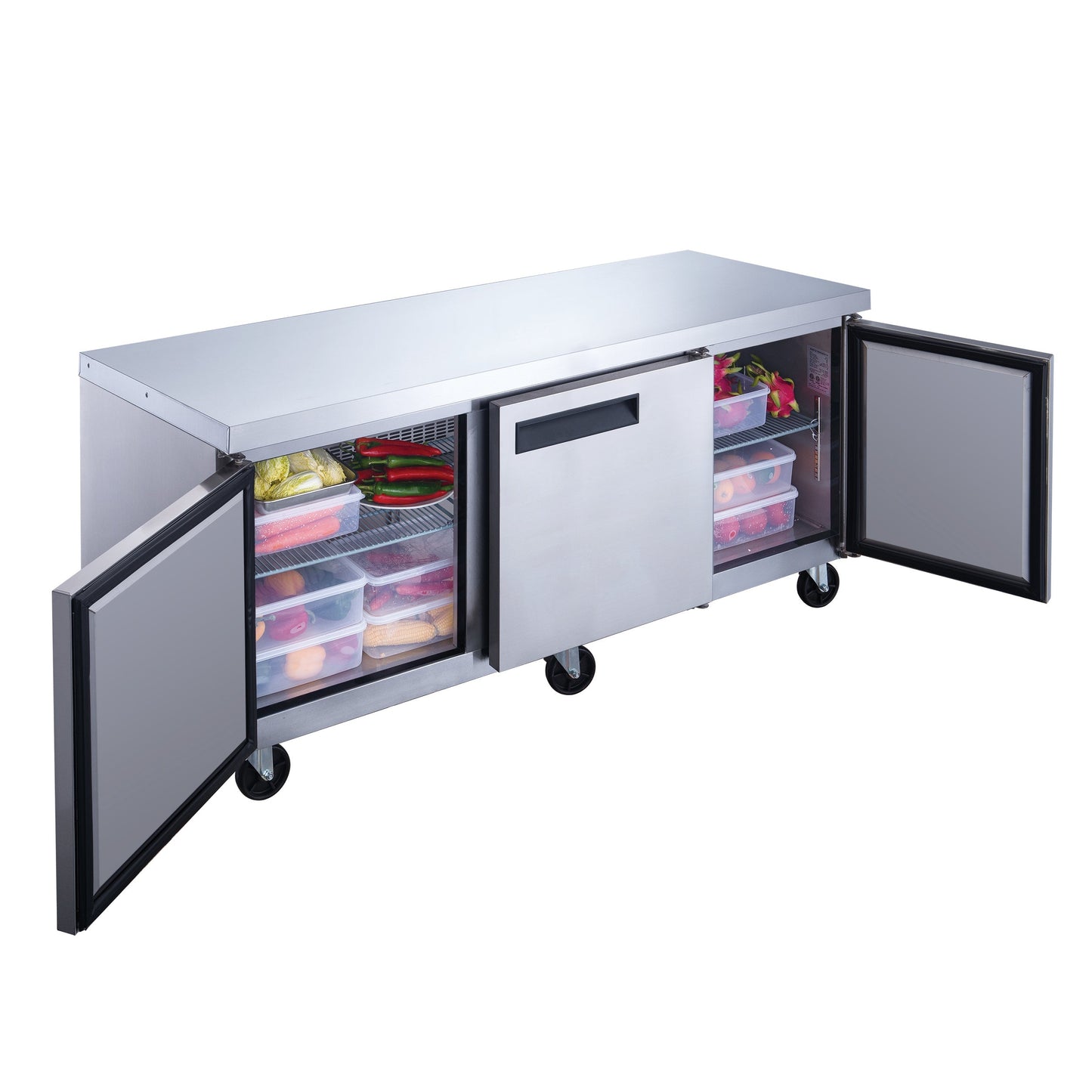
The Summit SPHC30 drawer refrigerator exemplifies smart kitchen design with its 29.5" width (perfect for standard kitchen line configurations) and durable stainless steel drawers that can handle heavy loads. Its digital temperature control maintains precise cooling, while the front-breathing condenser allows for under-counter installation without overheating.
Portable Thermoelectric Picks – Mobile or Spa Use
Not all commercial mini fridges need to stay put. Portable thermoelectric models serve specialized commercial needs where mobility or whisper-quiet operation is essential.
The Cooluli Classic 10L Mini Fridge and Frigidaire 10-Liter Retro Stainless Steel Mini Fridge offer versatility with their dual power options—they work with standard AC outlets or 12V DC car adapters. With no compressor, they operate in near silence, making them ideal for spa treatment rooms storing skincare products or luxury hotel rooms as premium minibars.
Commercial Mini Fridge Buying Guide: Key Features & Smart Savings
Selecting the right commercial mini fridge involves balancing several key factors to ensure you get the performance you need at a price that makes sense for your business. At PizzaPrepTable.com, we've guided thousands of businesses through this decision process.
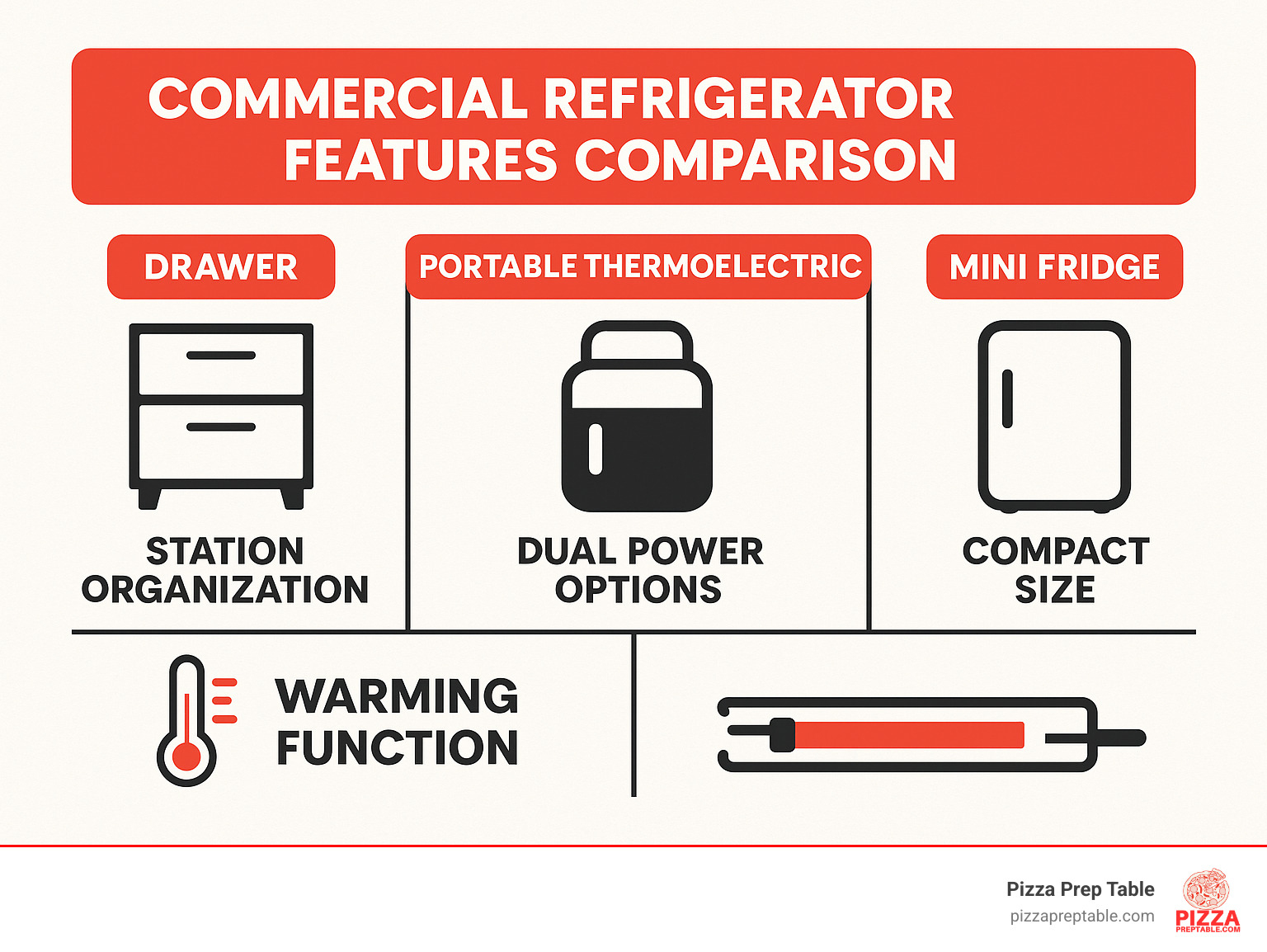
Sizing Up Your Space & Capacity Needs
One of the most common mistakes businesses make is selecting a commercial mini fridge that's either too large or too small for their needs. Here's how to get it right:
- Measure your available space precisely, including:
- Width, height, and depth of the installation area
- Clearance for door swing (typically 90-120 degrees)
-
Ventilation space (usually 3-5" at rear and sides)
-
Calculate your actual storage needs based on:
- Peak inventory requirements
- Product turnover rate
- Container sizes (cans, bottles, pans, etc.)
For reference: - A 1.7 cu. ft. unit typically holds 60 12-oz cans - A 3.2 cu. ft. unit can store approximately 115 12-oz cans - A 6.0 cu. ft. merchandiser might hold 200+ 12-oz cans
Different business types have different typical needs: - Gyms and fitness centers: 6-12 cu. ft. glass-door merchandisers - Hotel rooms: 1.7-2.5 cu. ft. quiet operation units - Bar back stations: 5.5-7.5 cu. ft. under-counter units - Restaurant prep stations: 27-30" drawer units
Energy Efficiency & Operating Costs
The purchase price is just the beginning of your investment in a commercial mini fridge. Operating costs over the unit's lifetime often exceed the initial purchase price.
ENERGY STAR certified models typically use 40% less energy than standard models. For example: - A standard 4.3 cu. ft. mini fridge might consume 358 kWh/year - An ENERGY STAR equivalent might use only 215 kWh/year
This difference translates to approximately $15-25 in annual savings per unit, which adds up significantly for businesses with multiple refrigeration units or those in areas with high electricity costs like California or New York.
Many utility companies offer rebates for ENERGY STAR certified commercial refrigeration, sometimes covering 15-30% of the purchase price. Our team can help identify available rebates in your area.
Must-Have Convenience Features
The right features can dramatically improve workflow efficiency and reduce long-term maintenance costs for your commercial mini fridge.
Essential features to consider include:
- Adjustable shelving: Allows reconfiguration as your product mix changes
- Door reversibility: Enables optimal placement in tight spaces
- Digital thermostat: Provides precise temperature control and easy monitoring
- Self-closing doors: Prevent temperature loss when staff are busy
- Interior lighting: Improves product visibility (especially LED lighting, which generates minimal heat)
- Lock options: Secure valuable inventory when needed
For food service operations, we strongly recommend units with removable gaskets for easy cleaning and sanitizing. This feature significantly extends the life of the refrigerator and helps maintain compliance with health department standards.
Installation, Maintenance & Noise Management
Proper installation and maintenance are crucial for maximizing the lifespan and performance of your commercial mini fridge. At PizzaPrepTable.com, we provide guidance to ensure your refrigeration investment pays dividends for years to come.
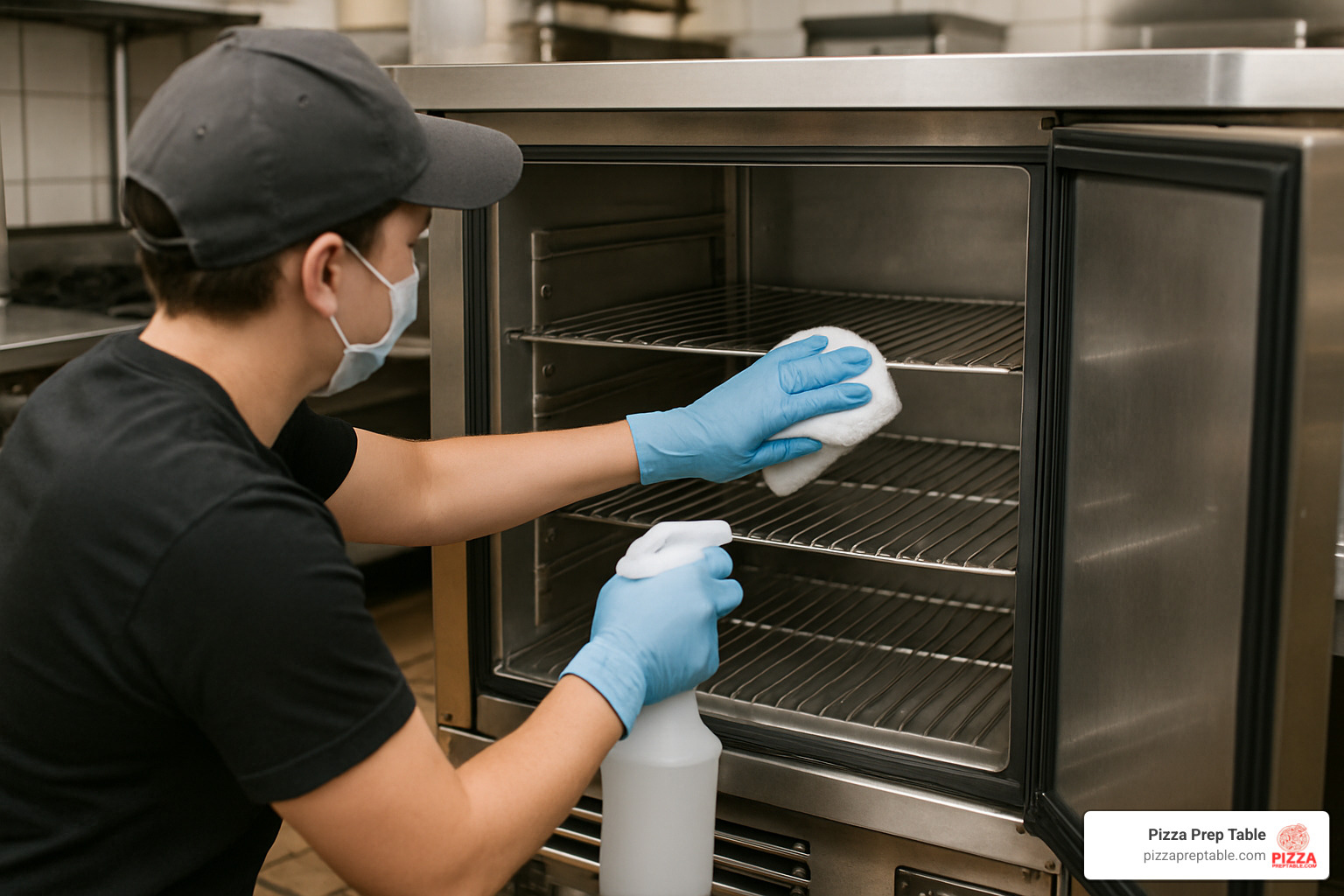
When installing your new commercial refrigeration unit, proper ventilation is absolutely essential. Most models need at least 3 inches of clearance at the back and sides to release heat effectively. I once visited a café in Denver where they had pushed their mini fridge flush against the wall – their compressor was working overtime and their energy bills showed it!
Making sure your unit sits perfectly level is another often-overlooked detail. Those adjustable feet aren't just for show – they ensure proper door alignment and drainage. Before loading up your new commercial mini fridge with product, give it a full 24 hours to reach and stabilize at the proper temperature. And while the unit's digital display is convenient, I always recommend using a separate thermometer to verify you're actually hitting those food-safe temperatures.
For businesses where noise matters – like boutique hotels or upscale dining areas – understanding decibel levels becomes crucial. Most compressor-based commercial units hum along at about 40-45 decibels, roughly the sound level of a quiet library. If you need something even quieter, thermoelectric models operate at just 30-35 decibels, though they won't cool as powerfully.
Regular maintenance doesn't need to be complicated, but it does need to be consistent. Weekly exterior wipe-downs and gasket checks take just minutes. Monthly condenser coil cleaning prevents the number one cause of premature failure. And if you're using a manual defrost unit, don't let frost build up beyond ¼ inch – it's like making your fridge work with a winter coat on.
Preventing Common Issues with Your Commercial Mini Fridge
Temperature swings are the enemy of food safety and product quality. When your commercial mini fridge starts showing inconsistent temperatures, dirty condenser coils are often the culprit. These coils release heat from the refrigeration system, and when dust builds up, it's like trying to cool your kitchen while wearing a sweater in August – inefficient and stressful on the system.
Door gaskets deserve special attention too. These rubber seals create the air-tight barrier that keeps cold air in and warm air out. Over time, they can crack, tear, or simply lose their magnetic grip. A quick monthly check can catch these issues early – just close the door on a dollar bill and try to pull it out. If it slides out easily, your gasket needs attention.
Overloading your fridge with warm products all at once is another common mistake. Your commercial mini fridge isn't designed to cool large amounts of room-temperature items quickly. Instead, add warm products gradually or, better yet, pre-chill them when possible. Your compressor will thank you with years of reliable service.
Warranty & Support – What to Expect
Commercial warranty coverage works differently than what you might be used to with home appliances. Most quality commercial mini fridge units come with 1-year parts and labor coverage, with extended 3-5 year protection for the compressor – the heart of your refrigeration system.
Unlike residential warranties, commercial coverage typically requires documentation that the unit was properly installed, regularly maintained, and operated within its environmental specifications. That's why we always recommend keeping a simple maintenance log – it can be the difference between a covered repair and an unexpected expense.
At PizzaPrepTable.com, we've built relationships with service providers nationwide. When warranty service is needed, we connect you with factory-certified technicians who understand commercial equipment.
Frequently Asked Questions about Commercial Mini Fridge
Why choose a commercial mini fridge over a standard dorm model?
When I talk to new restaurant owners, they often ask why they can't just grab an inexpensive dorm fridge from a big box store. The answer becomes clear once you understand what your business is up against.
A commercial mini fridge is built for the battlefield of daily business use. Think about it – a dorm fridge might be opened a handful of times daily, but that cute café on the corner? Their fridge door swings open over 100 times during a busy shift. Commercial units are designed with this punishment in mind, with reinforced hinges and tougher components throughout.
Temperature precision makes a huge difference too. Commercial units keep temperatures rock-steady within 2-4°F of where you set them, while residential models can swing wildly by 5-10°F. When you're storing perishable ingredients, that precision isn't just nice to have – it's essential for food safety.
Then there's the health inspector angle. I've seen the panic in owners' eyes when they realize their residential unit isn't NSF-certified. Health departments across the country require proper commercial refrigeration, and using the wrong equipment can lead to violations, fines, or even being shut down until you replace it.
The math on lifespan tells the real story: a quality commercial mini fridge typically gives you 7-10 years of reliable service in a business setting. Try using that residential unit commercially, and you'll likely be shopping for a replacement within 1-2 years. Suddenly that higher upfront cost makes a lot more sense!
How loud is a commercial mini fridge in quiet environments?
Noise matters, especially in spaces where customers or guests expect tranquility. I remember helping a boutique hotel owner who was concerned about refrigerator noise disturbing guests' sleep.
Compressor-based commercial mini fridges typically operate around 40-45 decibels when the compressor is running – about as loud as a quiet library conversation. During idle periods, they drop to around 30-35 decibels, which is barely louder than a whisper. Thermoelectric models maintain a consistent 30-35 decibels all the time, making them nearly silent in most environments.
If you're worried about noise, I've found these simple steps make a huge difference:
Set your fridge on a solid, level surface away from walls or cabinets that could amplify vibrations. Consider adding noise-dampening pads underneath – they're inexpensive but remarkably effective. Keep those condenser coils clean so the compressor doesn't have to work overtime (which creates more noise).
Do I need NSF certification for my commercial mini fridge in a café?
I get this question a lot, and I always give the same straight answer: if you're serving food commercially, NSF certification isn't optional – it's essential.
The NSF-7 certification specifically addresses food safety concerns, ensuring that your commercial mini fridge is built with safe materials, can be thoroughly cleaned, maintains proper temperatures, handles condensation correctly, and is designed to prevent bacterial growth.
Health inspectors from New York to San Diego don't just glance at your refrigeration – they check specifically for these certifications. Using non-certified equipment is one of the quickest ways to fail an inspection, which can lead to violations, fines, or even temporary closure until you get the right equipment.
Conclusion
Finding the perfect commercial mini fridge isn't just about measurements and specifications—it's about finding a reliable partner for your business that keeps your products fresh and your customers happy. After all, the right refrigeration can make your daily operations smoother while the wrong choice can lead to headaches (and potentially health code violations).
Throughout this guide, we've explored everything from glass-door merchandisers that showcase your beverages to drawer-style units that keep your prep line organized. Each type serves a specific purpose in the commercial world, where reliability isn't just convenient—it's your bottom line.
At PizzaPrepTable.com, we've helped thousands of food businesses find their refrigeration soulmates. Our team has seen how the right commercial mini fridge can transform a cramped bar into an efficient drink-serving machine or help a convenience store boost impulse purchases with strategically placed merchandisers.
As you make your decision, remember these essential points:
Choose a unit that matches your specific business needs—whether that's displaying drinks to drive sales or keeping ingredients within arm's reach during the dinner rush. Make sure it carries the proper certifications (especially NSF-7 if you're in food service), as this isn't just about quality—it's often a legal requirement. Consider the total ownership cost, including energy efficiency, which can save you thousands over the unit's lifetime. And don't forget about proper installation and ongoing maintenance, which can dramatically extend your refrigerator's lifespan.
The right commercial mini fridge is an investment that pays dividends through improved workflow, regulatory compliance, and years of reliable service. Whether you're opening your first pizzeria or upgrading equipment in your established café, choosing wisely now means fewer headaches later.
Ready to explore your options? Browse our complete selection of commercial refrigeration solutions that keep your ingredients fresh and your business running smoothly.
Keep Cool and Carry On: The Ultimate Commercial Fridge Freezer Combo Guide
